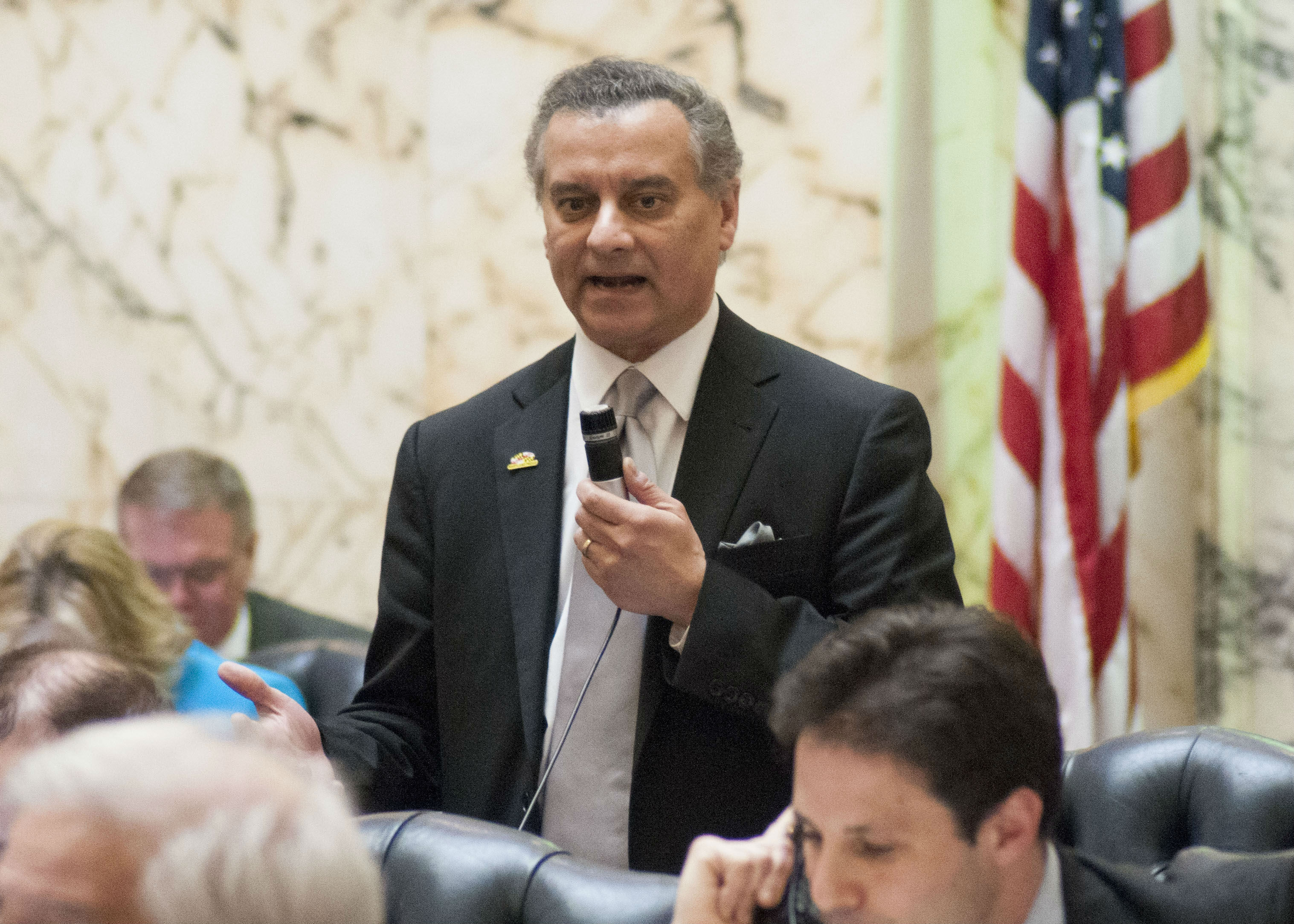Photo above: Environment Committee Chair Kumar Barve explains his support for the rain tax repeal.
By Rebecca Lessner
For MarylandReporter.com
A lone legislator let his disapproval rain down on House delegates the last night of session, as the Watershed Protection bill passed with only Del. Richard Impallaria opposed against 138 members.
“There are people who believe that what we are doing is repealing the rain tax,” said Del. Richard Impallaria, R-Baltimore and Harford. “They are still going to get a rain tax bill, every single year.”
Impallaria was alone standing in opposition to SB 863, the Watershed Protection and Restoration Program, sponsored by Senate President Mike Miller to allow counties and municipalities to regulate their own stormwater fee. Miller’s bill replaced Gov. Larry Hogan’s simpler repeal measure, a key part of his legislative package.
“I have to answer to them,” said Impallaria. “How do I go back to my constituents in Baltimore County and tell them those businesses are going to have to pay a two thousand, three thousand…five hundred thousand rain tax bill?”
Impallaria fears that not only will small business owners suffer, but the fee, which he believes is highest in Baltimore County, will deter business from locating to the county.
Fee will be optional, counties still need to mitigate stormwater
Impallaria is correct that the bill does not “repeal” the fee, according to the bill’s fiscal note.
The counties will instead have the choice of how to comply with the federal stormwater management requirements, whether it be with a fee or other revenue sources.
“This bill is not perfect, but it does change ‘you shall charge a tax’ to ‘you may charge a tax’,” said House Minority Whip Kathy Szeliga, R-Baltimore and Harford.
Szeliga noted the success her county, Harford, has had paying for their stormwater fee through county general funds.
All revenue collected from county fees will be deposited into the local watershed protection and restoration fund.
Counties will need to report a five-year projection of costs and revenues, including specifying funding sources, for permit compliance to the Maryland Department of the Environment (MDE).
Delegates cheer on bill
“This is the largest growing source of pollution in the Chesapeake Bay,” said Del. Kumar Barve, D-Montgomery. “Today, this bill has the enthusiastic support of the environmental community and the business community.”
Kumar adamantly supported the passage of the bill, with other legislators cheering him on from the House floor.
“We, in this legislature, are not letting the Chesapeake Bay go down on our watch,” said Barve.
The Chesapeake Bay Foundation called it “a major victory for the Chesapeake Bay.”
“We were holding our breath for the past few days and hours. The stormwater bill is a remarkable victory. What a turnaround for Bay issues this session,” said Alison Prost, Maryland Executive Director for the Chesapeake Bay Foundation.
“Polluted runoff is the main source of contamination for many urban and suburban creeks and rivers,” the foundation said in a statement. “Yet for years local governments have neglected upkeep to their stormwater systems, and failed to meet clean-up goals set by state and federal law.”
Impallaria was not discouraged.
“This is a full punishment on Baltimore County,” said Impallaria. “Because the fees in Baltimore County are higher than anywhere else.”
The Stormwater Remediation Fee was established by House Bill 987 in April of 2012. The law affects the largest urban jurisdictions in Maryland, counties with the largest pavement for stormwater runoff. HB 987 was created to meet the requirements of the federal Clean Water Act.
SB 836 passed 138-1 in the House before moving on to pass 47-0 in the Senate.




Recent Comments